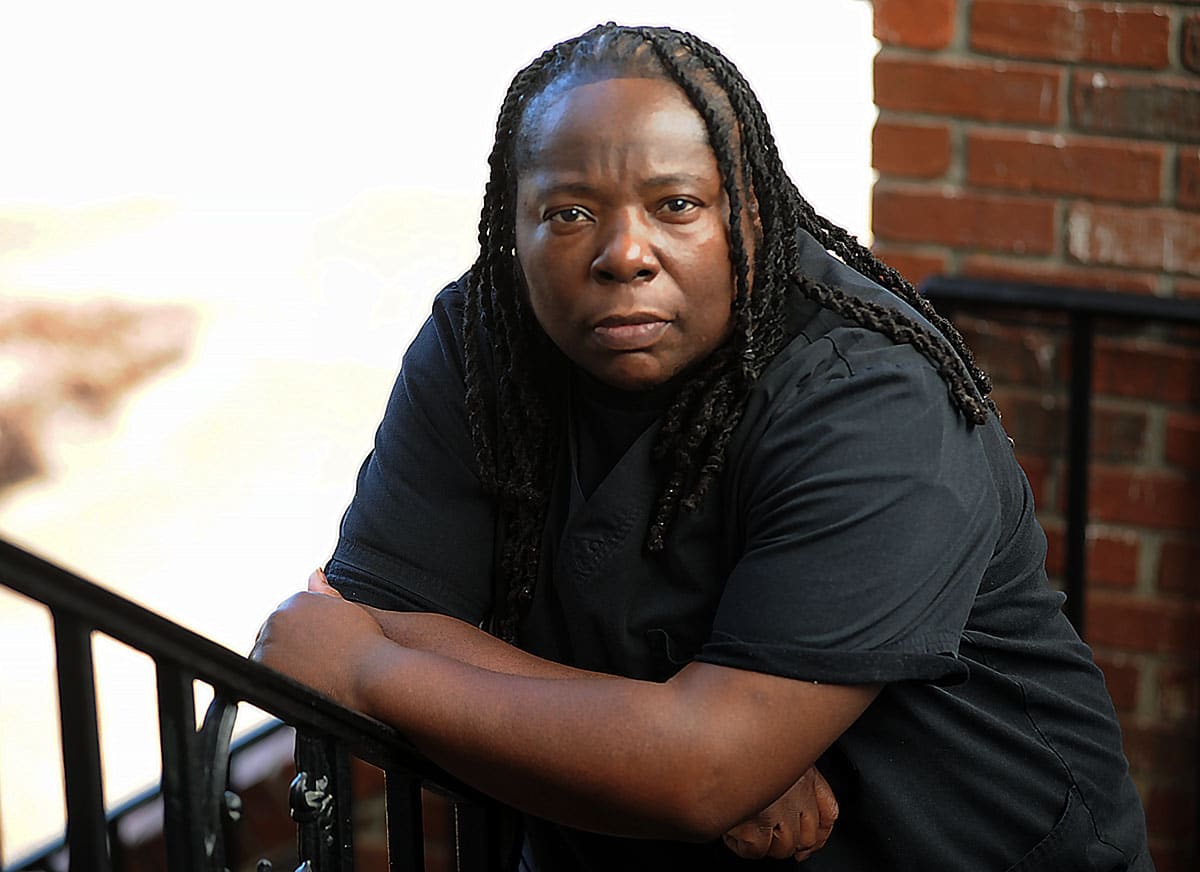Mississippi Today
Falling short: 99% of Mississippi nursing homes don’t meet new staffing regs

Viometrice Simmons remembers when she first fell in love with nursing. She was about 5 years old, sitting on the porch of her childhood home in Murfreesboro, Tennessee, as her aunt picked corn from the garden.
When she heard her great grandmother calling for her aunt from the bedroom, Simmons strode into the room, hopped up on the hospital bed and helped to turn and change the 84-year-old the way she had seen the women in her family do many times.
Forty-seven years later, that’s still the way she operates as a certified nursing assistant in the Mississippi nursing home she serves.
“When you walk in that door, every resident is your patient,” Simmons said.
Despite her dedication and more than 30 years of experience, she is only making $17 an hour at the nursing home where she currently works. In order to make ends meet, she works two jobs between 6 a.m. and 5 p.m., sometimes working overtime until 10 at night. She says some nights she gets out of work and sits in her car for an hour and a half because she’s too drained to move.
“I feel helpless. I feel exhausted,” she said. “But I know I got to keep going because who else is going to do it? If the people with the hearts give up, there’s going to be no one left for the people in there who are just forgotten about.”
Simmons never considered going back to school to become a registered nurse. What she loves about her job is being a familiar and reliable face for her residents. A CNA is responsible for providing the majority of hands-on resident care, and is often the person a nursing home resident sees the most on any given day.
“I don’t just want to be pushing pills,” Simmons said. “I want to let them talk to me. A lot of the residents tell me things that their families don’t even know about them.”
Poor pay and high turnover are among the reasons Simmons believes new federal staffing requirements in nursing homes will be, in effect, meaningless.
“Where are they going to get the staff from?” Simmons asked. “People are not doing it because they’re underpaid, and they can’t feed their families on that kind of money.”
In Mississippi, all but two of the 200 skilled nursing facilities – those licensed to provide medical care from registered nurses – would need to increase staffing levels under federal regulations the Biden administration proposed in September, according to data analyzed by Mississippi Today, USA TODAY and Big Local News at Stanford University.
That’s in line with the national trend: Over the first quarter of 2023 – from January to March – less than 1% of skilled nursing facilities in the U.S. met the draft rule’s two core standards of provider care.
After signing the executive order in September, Biden accepted public comment through Nov. 6. The Centers for Medicare and Medicaid Services is the agency responsible for reviewing the more than 40,000 comments and writing the final rule – which hasn’t happened yet and can take anywhere from months to years. Sixty days after the final rule is published in the Federal Registrar, the first phase in a staggered implementation process will begin.

Falling Short: Rebuilding elderly care in rural America
Rural nursing homes across the country, already understaffed, face significant new federal staffing requirements. With on-the-ground reporting from INN’s Rural News Network and data analysis assistance from USA TODAY and Big Local News at Stanford University, eight newsrooms explore what the rule change would look like for residents in communities across America. Support from The National Institute for Health Care Management (NIHCM) Foundation made the project possible.
The proposal, which comes at the heels of a years-long battle nursing home lobbyists waged against reform, outlines minimal standards. For example, the draft rule mandates 2.45 hours of CNA care and .55 hours of RN care per resident per day. That’s less than the 2.8 hours and .75 hours recommended by a CMS landmark 2001 study – even though residents’ needs have gotten more complex over the last two decades with more people living longer.
The proposal also mandates having an RN on duty 24-7. Current regulations mandate having 24-7 care, but allow the position to be filled by licensed practical nurses, who are used more frequently because their salaries are lower than those of RNs. The proposal does not have a requirement for LPN care, leaving experts worried nursing homes will simply replace LPNs with other staff.
“The 24-hour staffing requirement is good, as long as they make that in addition to the administrative nurses,” explained gerontologist and national nursing home expert Charlene Harrington. “But the other requirements they propose are just shockingly low. And that’s partly because the nursing homes have been lobbying against these standards for over a year and a half. So, all these advocates and the experts are very upset about it.”
The only two skilled nursing homes in Mississippi already meeting the not-yet imposed standards are Reginald P. White and James T. Champion nursing facilities – sister organizations of East Mississippi State Hospital, one of the state’s two psychiatric hospitals. The two Meridian nursing homes met the staffing minimums every day of the 91-day second quarter of 2023.
These homes receive about 20% of their funding from the state, according to Mississippi Department of Mental Health Planning and Communications Director Adam Moore. That’s in addition to the funding they receive from Medicaid and Medicare, as well as personal insurance and private pay.
Kevin Walker, administrator of Reginald P. White Facility, and Judd Nance, administrator of James T. Champion Facility, were surprised to learn they met the new requirements every day between April and June.
“We probably try to staff a little heavier than most nursing homes do, but we think we’re short all the time,” Nance said.
Having adequate staffing is one of the strongest predictors of whether nursing home residents will do well. And doing well doesn’t just mean the bare minimum of safety.
Any nursing facility participating in Medicaid or Medicare reimbursement is required by law to provide services that “attain or maintain the highest practicable physical, mental, and psychosocial well-being of each resident,” as dictated by the Nursing Home Reform Act of 1987.
Richard Mollot, the executive director of Long Term Care Community Coalition – a national nonprofit dedicated to advocating for residents of nursing homes and their families – says that when it comes to laws, the Nursing Home Reform Act is unique because it focuses on the customer – in this case, the resident.
“Most laws focus on the industry itself,” Mollot said. “For instance, all car manufacturers are expected to meet specific miles-per-gallon efficiency or have certain safety features. Nursing homes, on the other hand, are required to provide the staffing, supplies, and services to assure that every resident is able to attain and maintain their highest practicable well-being as an individual, based upon a comprehensive assessment of the person and a care plan that includes not only clinical needs, but the resident’s cultural background, goals, and personal preferences, too.”
Currently, states are in charge of regulating staffing in nursing homes. Some states have no staffing minimums, while the ones that do keep the requirements very low. In Mississippi, regulations require there to be at least a ratio of one CNA for every 15 residents during the day, and 25 residents at night – despite the fact that studies have shown one CNA for every six to eight residents during the day and 11 to 13 at night is optimal.
Even these suboptimal regulations are rarely enforced, according to Harrington, due in part to a national shortage of inspectors. States are required by the U.S. Department of Health and Human Services to conduct annual surveys and certifications of nursing homes receiving Medicaid and Medicare. In Mississippi, 54% of nursing home state surveyor positions were vacant in 2022, and 44% of the working surveyors had less than two years of experience.
“Enforcement is very weak, especially on staffing,” said Harrington. “We’d like to see CMS really crack down on the nursing homes that don’t have enough staff, and maybe put a hold on admissions until they have enough staff. If they’re not actually able to hire staff they shouldn’t be able to admit patients.”
Negligence that seems minor can compound into serious health issues and death – not to mention it often breaches basic expectations of dignity. Even in rehabilitation centers, where residents should be receiving support for mobility, low staffing can mean they are placed in diapers rather than assisted to bathrooms.
In previous nursing homes, Simmons says she witnessed bathroom requests going unanswered and continent residents being diapered out of convenience.
The results can be devastating. Residents who are confined to bed and unable to go to the bathroom not only suffer low morale, but can also develop concurrent urinary tract infections. In the elderly, these infections can cause delirium and exacerbate dementia. Those who try to get up on their own may suffer falls, broken bones and concussions as a result.
“You see residents with UTIs and falls and stuff because they’re crying out for help to go to the bathroom in the middle of the night and they fall because they have to go to the bathroom and they’re told to go to the bathroom in their briefs,” Simmons said. “Who wants to be sitting somewhere with a wet brief on? It’s humiliating. And it’s unacceptable.”
According to Mollot, it’s a violation of the Nursing Home Reform Act, and one that could be resolved with adequate staffing.
“Nursing homes claim that diapering residents is necessary because they don’t have enough staff to respond to call bells or implement resident-centered toileting practices,” Mollot said. “But if you think about it, that is pretty outrageous. In effect, facilities are admitting that they are taking in and retaining vulnerable human beings for whom they have neither the ability nor intention of providing decent care. Why do we accept the warehousing of millions of vulnerable Americans every year?”
Simmons says she has been let go twice, in two different states, shortly after filing incident reports to Occupational Safety and Health Administration and to the staffing agency she was contracted with.
But Simmons is resolved to continue advocating for the residents she serves and hopes that in time, higher pay and more stringent regulations will lead to better working environments for staff and quality of life for residents in nursing homes.
“I don’t care if they fire me from every job,” she said. “When I know something is not right, I’m going to stand up for it. And can’t nobody stop me from doing that.”
This article first appeared on Mississippi Today and is republished here under a Creative Commons license.
Mississippi Today
On this day in 1947, Jackie Robinson broke MLB color barrier
April 15, 1947

Jackie Robinson broke through the color barrier in Major League Baseball, becoming the first Black player in the 20th century.
Born in Cairo, Georgia, Robinson lettered in four sports at UCLA – football, basketball, baseball and track. After time in the military, he played for the Kansas City Monarchs in the Negro Leagues. After his success there, Dodgers general manager Branch Rickey signed Robinson, and the legendary baseball player started for Montreal, where he integrated the International League.
In addition to his Hall of Fame career, he was active in the civil rights movement and became the first Black TV analyst in Major League Baseball and the first Black vice president of a major American corporation.
In recognition of his achievements, Robinson was posthumously awarded the Presidential Medal of Freedom and the Congressional Gold Medal.
Major League Baseball retired his number “42,” which became the title of the movie about his breakthrough.
Ken Burns’ four-hour documentary reveals that Robinson did more than just break the color barrier — he became a leader for equal rights for all Americans.
This article first appeared on Mississippi Today and is republished here under a Creative Commons Attribution-NoDerivatives 4.0 International License.![]()
Mississippi Today
Mississippians highlight Black Maternal Health Week
Advocates and health care leaders joined lawmakers Monday morning at the Capitol to recognize Black Maternal Health Week, which started Friday.
The group was highlighting the racial disparities that persist in the delivery room, with Black women three times more likely to die of a pregnancy-related cause than white women.
“The bond between a mother and her baby is worth protecting,” said Cassandra Welchlin, executive director of the Mississippi Black Women’s Roundtable.
Rep. Timaka James-Jones, D-Belzoni, spoke about her niece Harmony, who suffered from preeclampsia and died on the side of the road in 2021 along with her unborn baby, three miles from the closest hospital in Yazoo City.
“It’s utterly important that stories are shared – but realize these are not just stories. This is real life,” she said.
The tragedy inspired James-Jones to become a lawmaker. She says she is working on gaining support to appropriate the funds needed to build a standalone emergency room in Belzoni.
But it isn’t just emergency medical care that’s lacking for some mothers. Mental health conditions are a leading cause of pregnancy-related deaths, defined as deaths up to one year postpartum from associated causes.
And more than 80% of pregnancy-related deaths are deemed preventable – making the issue ripe for policy change, advocates said.
“About 20 years ago, I was almost a statistic,” said Lauren Jones, a mother who founded Mom.Me, a nonprofit seeking to normalize the struggles of motherhood through community support. “I contemplated taking my life, I severely suffered from postpartum depression … None of my physicians told me that the head is connected to the body while pregnant.”
With studies showing “mounting disparities” in women’s health across the United States – and Mississippi scoring among the worst overall – more action is needed to halt and reverse the inequities, those at the press conference said.
The Mississippi Legislature passed four bills related to maternal health between 2018 and 2023, according to a study by researchers at the University of Mississippi Medical Center.
“How many times are we going to have to come before committees like this to share the statistics before the statistics become a solution?” Jones asked.
A bill that would require health care providers to offer postpartum depression screenings to mothers is pending approval from the governor.
Rep. Zakiya Summers, D-Jackson, the organizer of the press conference, commended the Legislature for passing presumptive eligibility for pregnant women this year. The policy will allow women to receive health care covered by Medicaid as soon as they find out they are pregnant – even if their Medicaid application is still pending. It was spearheaded by Rep. Missy McGee, R-Hattiesburg.
Summers also thanked Rep. Kevin Felsher, R-Biloxi, for pushing paid parental leave for state employees through the finish line this year.
Speakers emphasized the importance of focusing Black Maternal Health Week not just on mitigating deaths but on celebrating one of life’s most vulnerable and meaningful events.
“Black Maternal Health Week is a celebration of life, since Black women don’t often get those opportunities to celebrate,” said Nakeitra Burse, executive director of Six Dimensions, a minority women-owned public health research agency. “We go into our labor and delivery and pregnancy with fear – of the unknown, fear of how we’ll be taken care of, and just overall uncertainty about the outcomes.”
This article first appeared on Mississippi Today and is republished here under a Creative Commons Attribution-NoDerivatives 4.0 International License.![]()
Mississippi Today
Trump to appoint two Northern District MS judges after Aycock takes senior status
President Donald Trump can now appoint two new judges to the federal bench in the Northern District of Mississippi.
U.S. District Judge Sharion Aycock announced recently that she was taking senior status effective April 15. This means she will still hear cases as a judge but will have a reduced caseload.
“I have been so fortunate during my entire legal career,” Aycock said in a statement. “As one of only a few women graduating in my law school class, I had the chance to break ground for the female practitioner.”
A native of Itawamba County, Aycock graduated from Tremont High School and Mississippi State University. She received her law degree from Mississippi College, where she graduated second in her class.
Throughout her legal career, she blazed many trails for women practicing law and female jurists. She began her career as a judge when she was elected as a Mississippi Circuit Court judge in northeast Mississippi in 2002, the first woman ever elected to that judicial district.
She held that position until President George W. Bush in 2007 appointed her to the federal bench. After the U.S. Senate unanimously confirmed her, she became the first woman confirmed to the federal judiciary in Mississippi.
This makes Aycock the second judge to take senior status in four years. U.S. District Judge Michael Mills announced in 2021 that he was taking senior status, but the U.S. Senate still has not confirmed someone to replace him.
President Joe Biden appointed state prosecutor Scott Colom to fill Mills’ vacancy in 2023. U.S. Sen. Roger Wicker approved Colom’s appointment, but U.S. Sen. Cindy Hyde-Smith blocked his confirmation through a practice known as “blue slips,” where senators can block the confirmation of judicial appointees in their home state.
This means President Trump will now have the opportunity to appoint two federal judges to lifetime appointments to the Northern District. U.S. District Judge Debra Brown will soon be the only active federal judge serving in the district. Aycock, Mills, and U.S. District Judge Glen Davidson will all be senior-status judges.
Federal district judges provide crucial work to the federal courts through presiding over major criminal and civil trials and applying rulings from the U.S. Supreme Court and the U.S. Court of Appeals in the local districts.
This article first appeared on Mississippi Today and is republished here under a Creative Commons Attribution-NoDerivatives 4.0 International License.![]()
-

 News from the South - Arkansas News Feed7 days ago
News from the South - Arkansas News Feed7 days agoArkansas State Police launches new phone-free campaign
-

 News from the South - Arkansas News Feed5 days ago
News from the South - Arkansas News Feed5 days agoMeasles cases confirmed in Arkansas children after travel exposure
-

 News from the South - North Carolina News Feed6 days ago
News from the South - North Carolina News Feed6 days agoTax Day of April 15 is essentially May 1 in North Carolina | North Carolina
-

 News from the South - Alabama News Feed5 days ago
News from the South - Alabama News Feed5 days agoImpacts of Overdraft Fees | April 11, 2025 | News 19 at 10 p.m.
-

 News from the South - Missouri News Feed6 days ago
News from the South - Missouri News Feed6 days agoSleeping 14-year-old critically injured by bullet in Ferguson home; father flees scene
-

 News from the South - Texas News Feed7 days ago
News from the South - Texas News Feed7 days agoKSAT's Patty Santos speaks with Poteet Strawberry Festival court members, organization VP
-

 Mississippi Today6 days ago
Mississippi Today6 days agoProgram helps students with disabilities forge paths to careers
-

 Mississippi Today6 days ago
Mississippi Today6 days agoA self-proclaimed ‘loose electron’ journeys through Jackson’s political class



















































